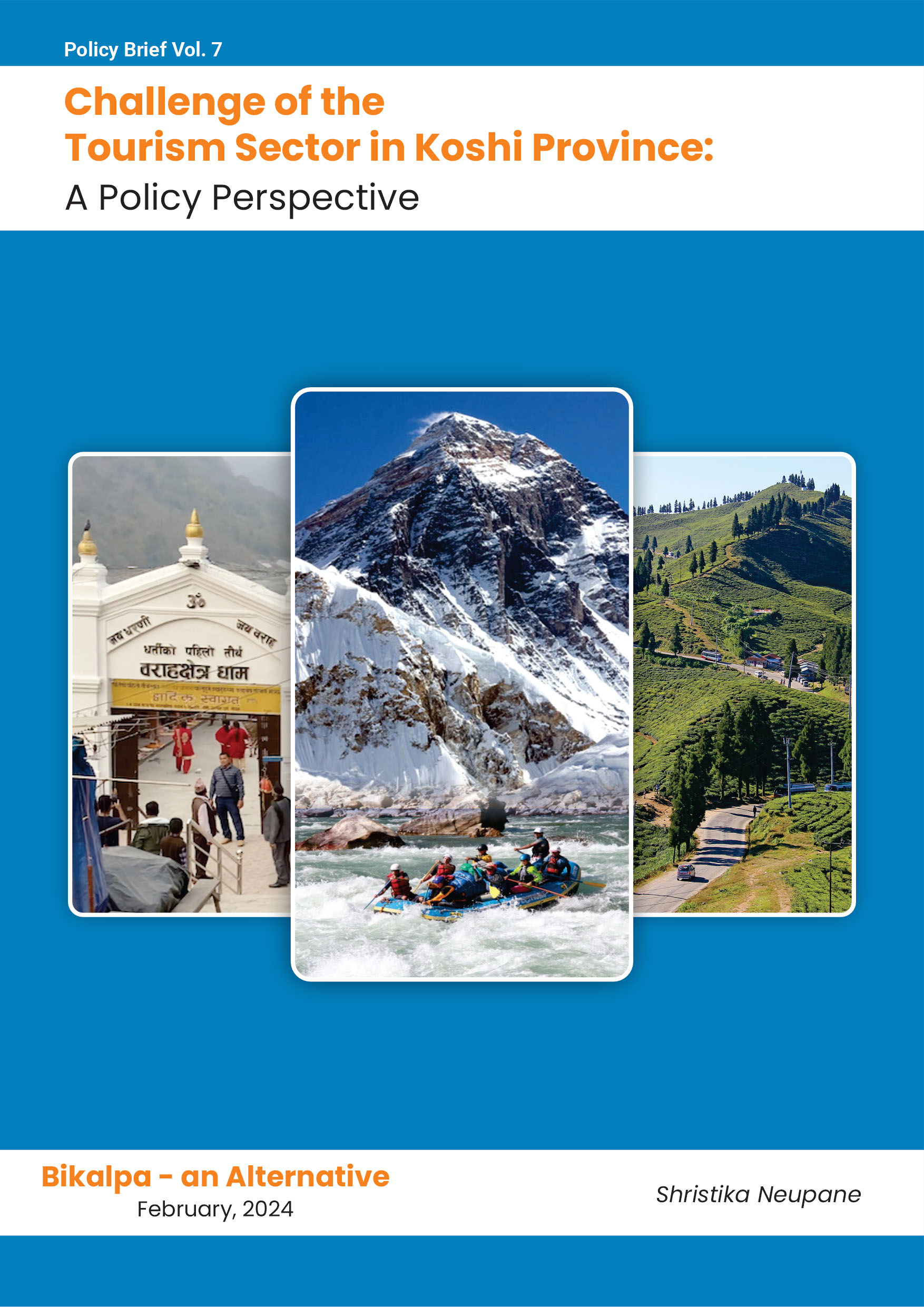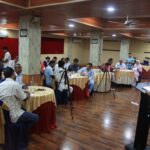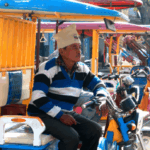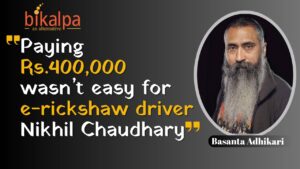
On January 4th, 2025, Bikalpa, an Alternative, with the support of CIPE International, hosted the One-day ‘Governance and Entrepreneurship Conclave’ at Hotel Shree Krishna in Biratnagar. The event aimed to foster discussions and understand the relationship between Governance and entrepreneurship. It also provided a platform for YPE fellows, Bikalpa fellows, and other participants to engage in meaningful conversations, exchange ideas, and learn from the experiences of successful entrepreneurs and experts.
During the session, speakers from different sectors joined the program which included interactive learning methods, networking, and Panel discussions which allowed participants to explore and share ideas about entrepreneurship and Governance. The program included the topics on Youth, Opportunity, and Entrepreneurship, Panel Discussion on Ensuring the Livelihood Opportunity of the E-rickshaw Drivers, Panel Discussion on Potentiality of Tourism in Koshi Province, Opportunity and Challenges in Health Sector of Koshi Province, Colloquium on Entrepreneurship and Youth, Governance and Accountability.
Among the distinguished speakers were, Mr. Anil Chitrakar (Social entrepreneur),Mr Tithendra Neupane (Biratnagar Metropolitan City ward 11 Chairperson ), Mr Parul Chhetri (Civil Society Member), Mr Bhagman Basnet ( Auto and E-Rickshaw Drivers’ Association, Central Member), Mr “Bhabish Shrestha (Tourism Entrepreneur), Mrs Dr Pramila Kumari Gachhadar (Province Planning Commission Biratnagar),Gyanendra Man Singh Karki ( Chairman, Birat Medical Teaching Hospital, Biratnagar ), Samir Chhetri and Rupesh Koirala (Former Chief Attorney General, Koshi province).

The event commenced with opening remarks by Mr. Bsanta Adhikari, who outlined the program’s objectives and extended a warm welcome to all participants. In his speech, he emphasized the importance of organizing such events to help youth gain a deeper understanding of governance issues and become strong advocates for them. After that the floor was handovered to Mr Suman Rai ,program coordinator formally started the session by introducing the first speaker of the session.
Anil Chitrakar ( Social Entreprenur )

The first session of the event was conducted by Mr. Anil Chitrakar, who delivered an insightful talk on freedom, entrepreneurship, and governance. Using the metaphor of “111,” he emphasized the synergy of idea, execution, scalability, and governance in creating exponential rather than linear products. He stressed that an impactful journey starts with a robust idea, followed by precise execution, scalability, and finally effective governance to sustain and amplify results.

He illustrated his points with examples. He highlighted Creasion, a Nepali company transforming plastic waste into bags. He explained the “1111 effect” of the company, showcasing how the alignment of idea, execution, scalability, and governance creates remarkable synergy. Similarly, he discussed the success of Chitwan National Park, where animal conservation was achieved through the involvement of local communities.
The government incentivized locals by allocating 50% of the park’s profits, fostering collaboration and innovation. Additionally, the development of biogas from bio-products in the region benefited over 400,000 households, demonstrating the impact of community-driven initiatives. The session also addressed Nepal’s commitment to becoming carbon-neutral by 2050. Through the metaphor of the “dead horse,” Mr. Chitrakar conveyed that every problem holds the seed of an innovative idea, as exemplified by the invention of the bicycle.
Mr. Chitrakar concluded by stating that true entrepreneurs create societal impact beyond profit motives. He critiqued the inefficiency of Nepal’s government in recognizing its abundant resources and leveraging them on international platforms. He also criticized vague governmental promises that often lack an understanding of the ground reality.
Next session was the breakout session. Participants were divided into two groups for the breakout session. 73 participants attended the ‘Ensuring the Livelihood Opportunity of the E-rickshaw Drivers’ which was moderated by Mr Basanta Adhikari. The convenors for the session include Mr Tithendra Neupane ( Biratnagar Metroplitian City ward Chairperson 11), Mr Parul Chhetri ( Civil Society Member)” Mr Bhagman Basnet ( Auto and E-Rickshaw Drivers’ Association). The discussion lasted for an hour and 30 minutes.
Parul Chhetri:

Mr. Parul Chhetri, who emphasized the socio-economic importance of city rickshaws and the challenges faced by their drivers. He highlighted that the issue of city rickshaws is not just a local concern but a national one. However, there has been little to no effort from the government or society to address it. In Biratnagar, Bikalpa is the sole organization consistently advocating for the rights and welfare of city rickshaw drivers. Mr. Chhetri stressed the need for collective action, urging everyone to raise their voices for the marginalized sections of society. He pointed out the lack of governmental engagement, mentioning that the Prime Minister and lawmakers have not yet addressed the issues affecting city rickshaw drivers, despite their direct link to the economic activity and livelihoods of low-income individuals.

Mr. Chhetri expressed disappointment that such a critical topic has never been discussed in the Parliament of Nepal. He criticized the government and political leaders for ignoring the struggles of hardworking, low-income individuals while rewarding others for their contributions. He urged policymakers, government officials, and city leaders to participate in sessions like this to understand the ground realities and be held accountable by the youth.
He proposed practical solutions, such as the provision of basic facilities like parking spaces, public toilets, drinking water, and charging stations, which would significantly improve the working conditions for e-rickshaw drivers. He also underscored that the government could resolve licensing and management issues promptly if it prioritized them. Concluding, Mr. Chhetri called for a more inclusive and equitable approach to city development, recognizing and supporting the contributions of marginalized groups like e-rickshaw drivers.
Tirthendra Neupane ( Ward Chair Person)

City rickshaw is the major means of daily life. It is also the means of earning for the illiterate and low income people. Biratnagar metropolitan is trying best to manage and solve the problem raised from city rickshaw. We are frequently making discussion and meeting to know the appropriate number of city rickshaw and proper policy for biratnagar. There are problems for everyone including Traffic Police, rickshaw’s drivers, and even the conditions of roads.
Biratnagar Metropolitan city is going to give registration to 3000 city rickshaws in Biratnagr. Despite this, only around 2000 rickshaws have been registered in the office of metro. But if we see the rickshaws in the road of Biratnagar 7000 plus rickshaws run every day. The problem is more than 50% rickshaws registered themselves in rural municipality and when they don’t get enough income they come to the Biratnagar. Talking about the problems of license, I think Province government should formulate the laws and policies regarding this and same should be implemented to all the local levels. If the drivers are illiterate then also they need to have the license to drive rickshaws. Local government can manage only the route and provide the permit for city rickshaw. The laws and policies regarding the license and insurance for city rickshaws should be formulated at province level.
The rules and regulations for city rickshaws may differ from province to province. Along with the license facility it is also necessary to provide the insurance facility for city rickshaws and drivers. There must be coordination between traffic police, city rickshaws drivers and local people.
Bhagwan Basnet

The matter of livelihood is directly connected with the problems of city rickshaw in Biratnagar. We are trying from local to federal level to overcome the problem of city rickshaw. From the central level we have already decided that there will be no writing exam for C1 (city rickshaw) license and they can get their license by directly passing the trail. We are forcing transport ministry and District Traffic Police Office to implement the decision made from central level. I am advocating the issue of license in many programs and discussion but until and unless the victim (drivers of city rickshaws) raises their voice against the problem, this problem isn’t going to be solved.
The rest 60 of the participants participated in the Panel Discussion on ‘Potentiality of Tourism in Koshi Province’ which was moderated by Mr Sabin Ghimire ( Journalist )

Bhawish Shrestha (Tousim Entreprenur)
During a session focused on promoting Koshi Province as a key tourism destination, Bhawish Shrestha shared valuable insights regarding the potential and challenges of developing tourism in the region. He emphasized that Koshi Province, with its open borders at Kakarvitta, Jogbani, Pashupatinagar, and Koshi Barrage, has immense opportunities to attract Indian tourists, given the large population living nearby and the cultural similarities between Nepal and India.
Mr. Shrestha highlighted the natural and cultural richness of Koshi Province, noting that four of Nepal’s eight highest mountains—Sagarmatha, Lhotse, Makalu, and Kanchenjunga—are located within the province. Additionally, the area boasts cultural diversity and potential for agricultural tourism, with 83% of Nepal’s churpi production originating there.

He also highlighted the province’s capacity to offer quality education, healthcare, and hospitality services, thanks to the presence of prestigious universities, colleges, large hospitals, and high-quality hotels. However, he acknowledged existing barriers to growth, such as insufficient marketing and branding efforts, as well as ongoing political instability, which have kept the tourism sector at a developing stage. Sharing data on tourist arrivals, Mr. Shrestha noted that over 1.2 to 1.3 million tourists visit Nepal annually. However, the data for Koshi Province mainly reflects the two-day stays of climbers and does not include tourists crossing the borders from India. This underscores the need for better data collection and recognition of the full scope of tourism activities in the province.
While Mr. Shrestha emphasized the importance of internal tourism, he suggested that attracting international tourists, particularly from India, is more profitable. He pointed out challenges faced by Indian tourists entering Nepal via border crossings, particularly due to strict police checks. However, he assured that new policies are being planned to ease these difficulties and facilitate smoother entry for Indian tourists.
He explained that tourists from India and SAARC nations are charged the same entry fee, which is relatively lower than the fees charged to international tourists from other countries. This pricing strategy aims to encourage visits from neighboring countries while also maintaining a higher revenue stream from global visitors.
According to Mr. Shrestha, medical tourism holds immense potential in Nepal. He noted that many Indian tourists travel to Nepal for health check-ups and that numerous Indian students come to Nepal to study medicine. He suggested leveraging these medical tourism opportunities by encouraging visitors to explore the diverse attractions in Koshi Province. Utilizing the medical sector as a gateway to promote local tourism could significantly benefit the region.
In conclusion, Mr. Shrestha stressed that tourism is the most viable path for Nepal’s progress, as it requires relatively low capital investment while offering substantial economic and social benefits. He called for collective efforts to address existing challenges and unlock the full potential of the tourism sector in Koshi Province.
Dr Pramila Kumari Gachhadar (Province Planning Commission Biratnagar)

Dr. Pramila delivered an insightful session on Koshi Pradesh’s policy for tourism development. She emphasized that Nepal’s unique appeal lies in its majestic mountains, rich cultural heritage, and adventurous activities like trekking and canyoning, which continue to attract tourists from around the globe. To capitalize on these strengths, Koshi Pradesh has outlined an ambitious plan for the upcoming tourism year 2082, allocating a budget of NPR 10 crore. This investment aims to enhance tourism infrastructure and services, including training programs for tourist guides, increasing the number of quality hotels, and branding special products of the province. Advertising Nepal’s tourism potential through diverse platforms is also a priority.

Dr. Pramila underscored the importance of improving the behavior of locals and tourist guides to create a welcoming environment. She stressed that knowledgeable guides who can effectively narrate the history of local sites would significantly enhance the tourist experience. Additionally, maintaining environmental sustainability and upgrading overall management and hotel quality are crucial for long-term success.

She elaborated on Koshi Pradesh’s Bahubarsiya Karyakram, which includes 19 key plans, such as the conservation of the great panda in Ilam, establishing a zoo, and founding a tourism college in Solukhumbu to foster specialized education in tourism. The policy also includes provisions for homestays, ensuring tourists can immerse themselves in local culture. Dr. Pramila’s discussion shed light on Koshi Pradesh’s integrated and strategic approach to tourism development, which combines cultural preservation, environmental conservation, and modern infrastructure to position the region as a premier destination.
After lunch, the session on ‘Opportunity and Challenges in Health Sector of Koshi Province ‘ was moderated by Mr Basanta Adhikari
Gyanendra Man Singh Karki ( Chairman, Birat Medical Teaching Hospital,Biratnagar )

Dr. Gyanendra Man Singh Karki, the Chairman of Birat Medical Teaching Hospital in Biratnagar, was the main speaker of the session. During his speech, Dr. Karki recounted various instances from his medical and entrepreneurial journey, offering motivation and guidance to the young participants. Born in Damak, Jhapa, he completed his schooling in Biratnagar. After finishing his SLC, he went to Darjeeling for his I.Sc and B.Sc.
He was then selected to pursue MBBS in Russia, where he earned his MD degree before returning to Nepal. He worked as a doctor for nearly two years in his homeland before returning to Russia to study MS in Obstetrics and Gynecology. After completing his Master’s degree, he came back to Nepal and joined the Maternity Hospital in Kathmandu.
Dr. Karki shared a pivotal moment in his life when his mother passed away during a visit to Biratnagar. This event led him to move to Biratnagar with his wife and two sons, sacrificing his well-established life in Kathmandu. He recalled starting his professional career at Koshi Zonal Hospital, where private hospitals were non-existent outside the Kathmandu valley, and the surgical facilities for women were substandard. Women often had to wait 3-4 years for surgery, with only 10-12 major operations performed annually.
He requested the hospital manager to allow him to perform surgeries every day of the week. Initially met with resistance, he eventually secured four days a week for surgical duties. He performed 7-8 surgeries daily and cleared the long waiting list within seven months. He then opened his own hospital, starting with a rented house, one nurse, one OT boy, and one floor maid.
Despite skepticism from others, he remained focused on his vision to serve the people of his town. Over three years, he expanded his 25-bed hospital into what is now known as Birat Nursing Home. With 25 years of dedication, his one-bed hospital has transformed into Birat Medical College and Teaching Hospital, graduating 100 doctors annually and housing 1200 beds.

He addressed the confusion in Nepal regarding the definition of the medical sector, emphasizing that while the sector should be non-profitable, organizations must still generate some profit to sustain themselves. He highlighted the remarkable progress in Nepal’s medical sector, noting that Biratnagar now has 14 CT Scan machines, 5 MRI machines, and 3 heart machines, all achieved by the private sector. He criticized the government for showcasing this progress while neglecting the private sector’s needs.He mentioned that studying medicine in Nepal is now more accessible, unlike during his time when there were no medical colleges in the country. He went to Russia for further studies and returned to Nepal in 1980 to work at the Maternity Hospital. In 2015, he started his own nursing home.
Dr. Karki discussed the rapid development of Nepal’s medical sector but pointed out the irrational distribution of health services due to a lack of government support for the private sector. He stressed the need for better utilization of resources and highlighted that 75-80% of health services in Nepal are provided by the private sector. He also addressed the issue of nurses emigrating to other countries, causing a shortage in Nepal. He urged the youth to gain knowledge and skills abroad and return to Nepal to contribute to the country’s development.
During the Q&A session, participants asked about high service fees and the lack of medical facilities in rural areas. Dr. Karki explained that private hospitals are not forcing patients to seek their services and that government hospitals offer similar services at lower costs. He emphasized that hospitals need to generate profit to provide high-quality services and sustain themselves. He also noted that establishing hospitals in rural areas is challenging due to low population density and suggested improving transportation facilities to enable easier access to urban health services.
Samir Chhetri
The colloquium on entrepreneurship commenced with introduction by Samir, who elaborated on the concept of entrepreneurship and its pivotal role in driving economic growth. He highlighted how entrepreneurs spur innovation, generate employment, and significantly contribute to the overall economy. Samir then encouraged participants to share their viewpoints, sparking a dynamic discussion on the diverse contributions of entrepreneurship to economic development.
Participants pinpointed key ways entrepreneurs impact society, such as introducing innovation, solving problems, and creating new opportunities. The discussion focused on two main types of entrepreneurs: Opportunity Seekers, who identify market gaps and devise solutions, and Creative Disruptors, who challenge existing systems to bring about groundbreaking changes. Examples like Pathao, addressing transportation issues in Nepal, were cited as opportunity-seeking ventures, while global disruptors like Snapchat and Facebook were mentioned for revolutionizing communication.

The session explored the broader implications of entrepreneurship, including its role in job creation, fostering competition, and tackling societal issues. However, challenges such as over-commercialization, market monopolies, and environmental concerns were also discussed. Participants emphasized the importance of ethical and sustainable practices to address these challenges.
A stimulating debate emerged on whether Nepal currently needs more opportunity seekers or creative disruptors. Some argued that opportunity seekers are better suited to tackle immediate problems like unemployment and inadequate infrastructure. Others believed that creative disruptors could offer transformative, long-term benefits by reshaping industries and addressing systemic issues. Ultimately, there was a consensus that both types of entrepreneurs are essential for Nepal’s progress.
The colloquium concluded with a shared understanding that balancing immediate needs with long-term innovation is crucial. Participants left with a renewed appreciation of entrepreneurship as a powerful tool to drive sustainable growth and development in Nepal.
Rupesh Koirala (Former Chief Attorney General, Koshi province)

A session on Youth Governance and Accountability was facilitated by Mr. Rupesh Koirala, offering an insightful exploration of governance principles, the rule of law, and their interplay with entrepreneurship. Mr. Koirala began by reflecting on the frequently evoked yet seldom defined term “rule of law,” citing Aristotle’s principle: “Government should be by law, not by man.”
Mr. Koirala began by emphasizing the pivotal role of youth in governance, highlighting their potential to drive change and foster accountability in public institutions. He underlined the significance of active youth participation in decision-making processes at local, national, and levels. During his presentation He reflected on the defined term “rule of law,” citing Aristotle’s principle: “Government should be by law, not by man.”
He elaborated on the eight pillars of the rule of law, emphasizing their role in maintaining justice and accountability. These pillars include the Supremacy of Law, Equality before the Law, Distribution of Justice, Equality among Equals, Accountability to the Law, Fairness in the Application of the Law, Separation of Power, and Participation & Decision Making, along with Legal Certainty. Each of these components, he explained, is essential to fostering a society governed by just and impartial laws.
The lecture also shed light on key principles of accountability, including transparency, responsibility, and ethical governance. Mr. Koirala explained how young leaders could uphold these principles by being well-informed, engaging with their communities, and maintaining integrity in their actions.
During the session, Mr. Koirala also delved into the interconnection between governance and entrepreneurship. He illustrated how state policies could either facilitate or hinder entrepreneurial growth, noting that systems such as private property rights provide individuals with the incentive to innovate and invest. He stressed that without property rights, the foundation for business initiatives would weaken, as individuals would lack the security to utilize their resources effectively. The session concluded with a vibrant discussion, leaving participants with a clearer perspective on the critical role of governance in shaping accountable societies and promoting economic growth through entrepreneurship.











